Right-Wing Media and the Death of an Alabama Pastor: An American Tragedy
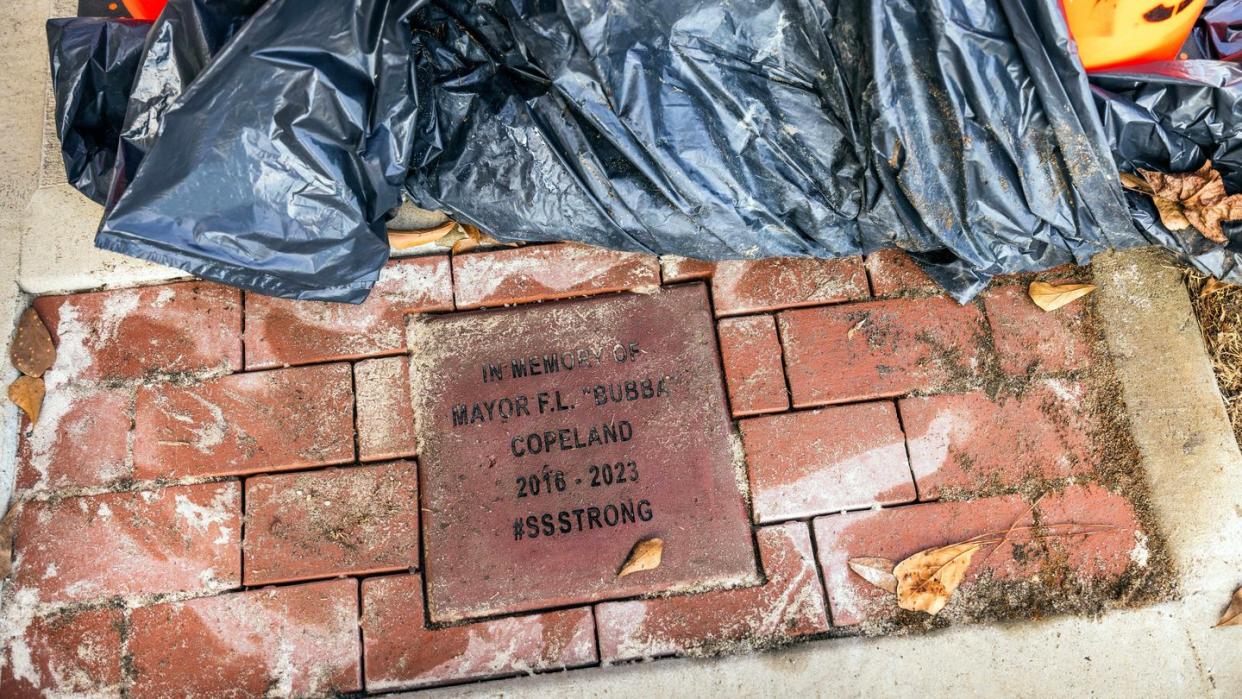
- Oops!Something went wrong.Please try again later.
At the First Baptist Church of Phenix City, Alabama, the last Sunday of October 2023 was Pastor Appreciation Day. The church was festive, the service well attended. There was strawberry cake, Pastor Copeland’s favorite, and special music in his honor by two of his closest friends, who sang a program of Baptist hymns, accompanying themselves on piano. Bernard Vann, the church’s elder statesman, spoke from the pulpit on behalf of the congregation, testifying as to how blessed they all felt that Bubba Copeland had entered their lives and bestowed his gifts, bound them together as a spiritual community. After reading a very long list of duties that make up a churchman’s life, Vann ribbed Bubba that he sure was getting a lot of attention that day for a job that’s just “one day a week.” Then he turned to Bubba and said, “We as a church love you, and we appreciate you for everything you’ve done,” with the true feeling of an old man, as he embraced his pastor.
Once Vann took his seat, Bubba stepped up to the pulpit. “I am so undeserving,” he said. “I don’t come from a background of being a pastor. I come from a background of loving people. And I believe there’s a giant difference between being a Christian and being Christlike. I try my best to be Christlike. There’s a lot of Christians that hurt people. What we should strive to do is go out of our way to love people unconditionally, despite who they are, what they are—because you know why? Jesus loves me.”
Bubba would often talk about how his life had been suffused with a grace that was beyond his comprehension. He believed that was the essence of God, and today he was telling his congregation that if God could love him—of all people—it was a sure sign that God loved everyone created in His image.
That last Sunday of October 2023 would be the last Sunday of Bubba Copeland’s life.
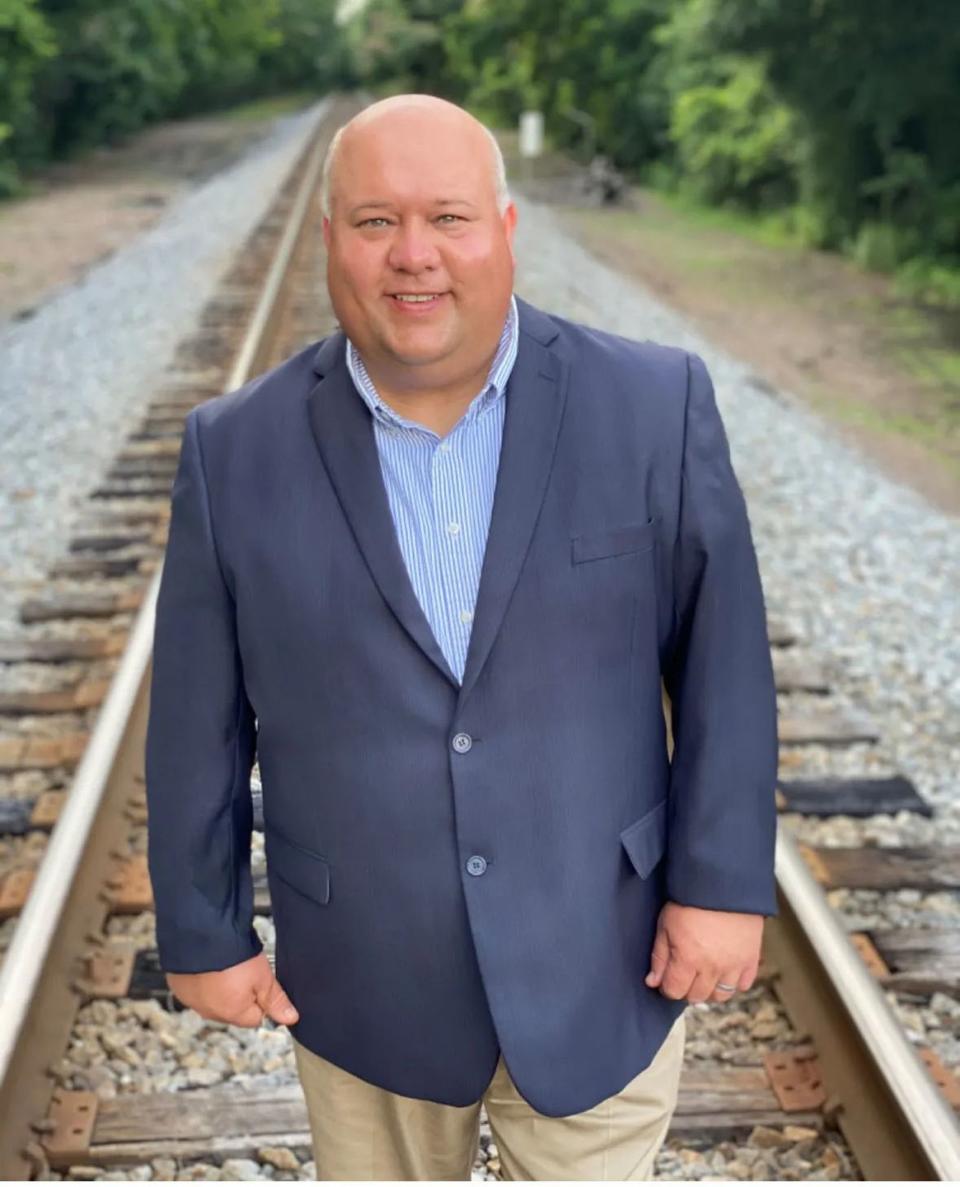
We all have things that we don’t want other people to know about us. Things that might be hard to explain, even to ourselves. The world can be an unforgiving place, quick to judge, and friendships can be fleeting. Would the people whose regard means the most to us look at us differently if they learned of our hidden selves? Would they abandon us? Surely God knows our secrets. What does He think of us?
This is a story about just that—what God thinks. It’s also a story of identity and exposure, of revenge and public humiliation. Of deep love and senseless loss, and the unending grief of a small town.
And secrets. It is a story about secrets.
Bubba Copeland had many secrets. And as a servant to both God and man, the judgments of heaven and earth were the alpha and omega of Bubba’s existence. What God thinks of anything, much less any of us, is difficult to discern, if we are honest. But the people of the First Baptist Church of Phenix City, Alabama, unabashedly adored Bubba.
He was empathetic and industrious and always seemed to be doing something for somebody. By last fall, he had been the senior pastor at First Baptist for four years and the church’s youth minister for fifteen years before that. Bubba was not seminary trained and was not what you might call an intellectual from the pulpit, but what he lacked in academic theology he made up for in his eagerness to answer to the spiritual and material needs of others, no matter the time or expense. According to the people in his church family who knew him best and loved him most, Bubba possessed an enormous capacity to serve, and his sermons were personal, compassionate, and often funny. As a Christian and as a pastor, he thought that in a pinch the Sermon on the Mount was just about all the Bible a man would ever need, and his favorite verse was Matthew 7:1—“Judge not, that ye be not judged.” All he knew about the ministry he had learned by the side of his first father-in-law, Dr. Eugene Langner, who pastored to the souls of the congregation at First Baptist Church for thirty years until his death in 2013. Even after Bubba and Merrigail, Langner’s daughter, got divorced, the two men maintained a loving friendship. Bubba and Merrigail had given Langner a grandson, after all. Young Carter Copeland would grow up underfoot at the church, singing hymns from the pulpit with a poise that would make his father cry. Grandfather, father, and son remained exceptionally close, their relationships unburdened by the strain that often comes with divorce.
By the last Sunday of October 2023, not only were Bubba and his second wife, Angela, and his two stepdaughters the first family of First Baptist Church, but the Copelands were also the first family of nearby Smiths Station, Bubba’s hometown, where he was finishing his second term as mayor. He was renowned for bringing a Love’s truck stop to the main highway through town, a feat of economic development that most mayors of towns the size of Smiths Station (population: 5,470) can only dream of—to hear the awe with which the people there talk about that truck stop, you’d think Bubba had brought IBM to town. When a tornado struck Smiths Station in 2019, killing twenty-three East Alabamians in the neighboring community of Beauregard, he was a twenty-four-hour one-man rescue crew—removing debris, providing supplies and reliable information to his people, and offering hugs when nothing else would do. That same year, when a high school senior in Smiths Station named Lexi Webb took her own life, Bubba initiated #SSNotOneMore, a suicide-prevention campaign. On the night before school started, without telling anyone they were doing it, Bubba and a group of volunteers scattered hundreds of signs all over town: YOU ARE WORTHY OF LOVE. YOUR MISTAKES DO NOT DEFINE YOU. YOU MATTER. DON’T GIVE UP. He had Post-it notes printed with the same affirmations and had volunteers pass them out at all the schools.
In his spare time, Bubba also owned and operated the Country Market over in Salem, where he had a reputation for employing local folks who might have trouble finding work elsewhere. His social-media feed was always full of cheerful posts about the latest specials on pork butts and paper towels. Life was good, if maybe a bit hectic.
In his corner of the world, Bubba Copeland was needed, and he loved being needed.
David White, a retired doctor and chairman of the First Baptist Church board of trustees, was always urging Bubba to take a break, get out of town with Angela and the girls on vacation, disconnect for a while. “My only concern for Bubba was that he was spread too thin,” White says. “But his idea of a vacation was thinking up new outreach programs for the church.”
The Reverend Ralph Wooten, who for several years was pastor of the First United Methodist Church in Phenix City, says he first saw Bubba “emerging from a cloud of barbecue smoke” at the First Baptist annual cookout, and the two men became dear friends. “Bubba was a father of a blended family. He was a husband. He was a pastor. He was a successful small-business owner. And he was the mayor of a town that he loved,” says Wooten. “Any one of those things is enough for one human being, and yet he was all of those things. I knew it was a lot and encouraged him to take care of himself. He seemed to be taking it all in stride.”
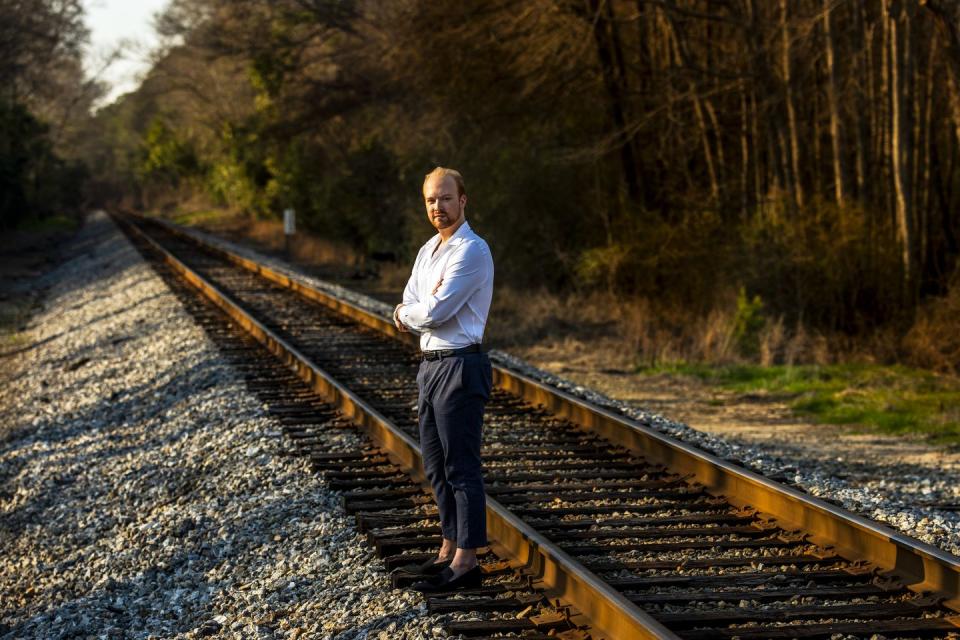
Daniel Windsor, a dentist in Phenix City and a longtime member of Bubba’s church, says that Bubba was a “five-finger friend”—that is, he was one of a small group of cherished people in Windsor’s life so vital that you can count them on one hand. “He was an indispensable friend—and I loved him dearly,” Windsor says.
Jay Jones, the sheriff of Lee County, Alabama, says that “Bubba was hard not to like. He was that selfless and that reliable, the sort of person who rushes toward need, no questions asked. There aren’t that many people like Bubba in this world.”
The sign on the lawn in front of Bubba’s church read ALL ARE WELCOME. And all were welcome. For Bubba, that was how God worked in people. You might call it the essence of the Copeland theology. “Ain’t God good?” he would say to friends and strangers alike. And with Bubba, you were never a stranger for long.
Dan Elkins became a member of First Baptist Church in 2018. He was himself a Baptist minister and for ten years had successfully tended his own flock in an “itty-bitty” town in southern Alabama. Married with two kids, Elkins had tried to make his marriage work even though he had known for years that he was gay. After he and his wife divorced in 2003, he resettled in Phenix City, where he would meet his husband, Jason Price. Their first date was at the Home Depot. “In case it didn’t work out, you always need something at Home Depot, right?” Price says with a laugh.
Both Elkins and Price have a deep faith and struggled to find a church that would be a true spiritual home for them, where they would be welcomed as full-fledged members, not “as lesser than.” “There’s churches that will cash our checks and let me and my husband sit in the back pew, but we didn’t want that. We feel that we have a lot to give and love being involved in a vibrant community,” Elkins says. They had heard good things about First Baptist in Phenix City, but Price had serious reservations about committing to a Baptist church. “I thought, I ain’t going to no Southern Baptist church,” he says. “Been there, done that.”
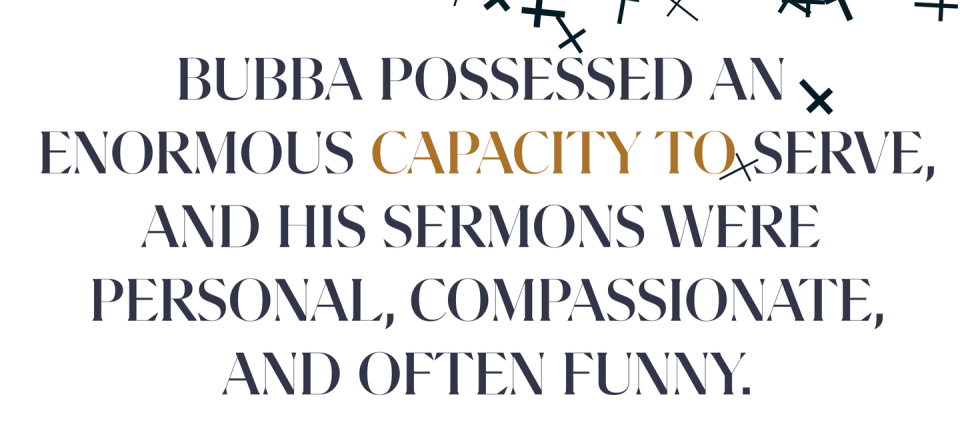
Elkins first wanted to talk to the pastor, have a frank conversation, and manage everyone’s expectations from the start. Elkins called the mayor’s office in Smiths Station, and Bubba said to come on by. “We sat there across from each other, and I told him that Jason and I wanted to be members of a church where we would be treated with dignity and respect and welcomed without reservation.” Instantly, Bubba responded, “Dan, you are my brother. God has blessed our church by sending you to join us.” Bubba added that his son was gay and that he was “not sure how to relate to him. God has brought you into my life to be Carter’s gay stepdad.”
“So we joined First Baptist and never looked back,” Elkins says. “It’s hard for me to express the depth of my gratitude for what Bubba gave us.”
It’s not that Bubba’s friends idealized him or thought he was perfect—they didn’t, and he wasn’t. For one, he had to keep a laminate of the Lord’s Prayer in a right-hand corner of the pulpit at First Baptist, as he sometimes forgot the words. A bigger problem for Bubba was that he worried too much about what people thought of him. And he spent way too much time looking at his phone. These days, of course, there is a direct correlation between those two things. Bubba felt an unending sense of responsibility to the people of his church family and to the people of Smiths Station. An unkind comment on Facebook could keep him up at night. If this is a common modern affliction, Bubba had an acute case.
It would be his undoing.
At the end of the Pastor Appreciation Day service, Bubba joined Dan Elkins and Daniel Windsor at the piano on the altar to sing a favorite song. The Lord did not bless Bubba with much of a singing voice, but what he lacked in talent he made up for in effort. The song was “Sweet Beulah Land,” and the second verse goes like this:
I’m looking now, just across the river
To where my faith shall end in sight
There’s just a few more days to labor
Then I will take my heavenly flight
Three days later, on the morning of Wednesday, November 1, an online news site called 1819 News, which states as its mission the promotion of “Alabama values,” published a story about Bubba Copeland and all his secrets. Titled “The secret life of Smiths Station Mayor and Baptist pastor F. L. ‘Bubba’ Copeland as a ‘transgender curvy girl,’ ” the story was about Bubba’s hidden online life and featured pictures of him in makeup and a blond wig, wearing women’s underwear and clothes. He had posted the pictures to Reddit subgroups, including one called TransLater, where they would collect comments such as “Sister you look beautiful. Cute outfit,” and Bubba would reply, “Thank you doll!”
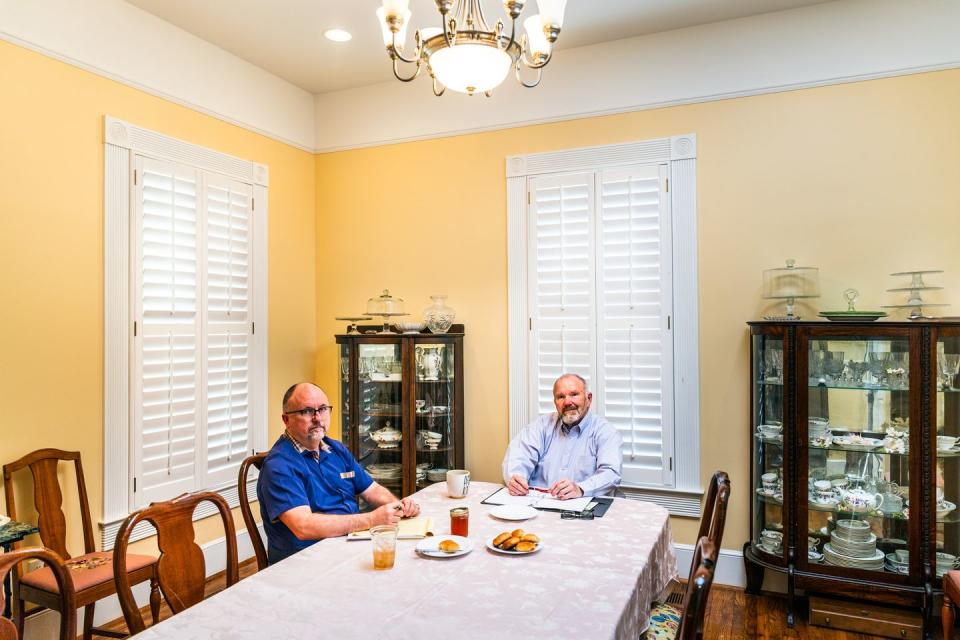
When the 1819 News correspondent, Craig Monger, had called for comment, Bubba had begged him not to publish the story, fearing that news of his private life exploding into public view would embarrass his family, his town, and his church. Dressing up was something he and his wife had done on a lark, he told Monger. He then went further, saying that cross-dressing was something he had done on occasion since he was a young man, a hobby to relieve stress. “I have a lot of stress,” he told Monger. “I’m not medically transitioning. It’s just a bit of a character I’m playing.”
“The more I talked to them, the more turned around it got,” Bubba would tell a friend.
When the story hit the next morning, Bubba’s son Carter, a junior at Auburn, was still asleep. He woke up to a text from his best friend that read, “I’m so sorry. I don’t know what to say. I don’t know what to do.”
“I had no idea what she was talking about,” Carter says. “I called her, and she told me what had happened. Immediately, I looked up my dad’s name online and saw it everywhere. It was early in the morning, and every news outlet I’d never heard of had already jumped on it, like piranhas. I watched the whole world tear him down almost instantaneously.”
Carter and his father were extremely close. Over the years, each had confided in the other about their innermost struggles—in high school, Carter had come out to his father, and Bubba had shared his secrets with his son. Carter was shocked at the meanness of the story and was overcome with a visceral fear that he had never known before. In a panic, he called his dad.
“He picked up and said, ‘Good morning, buddy.’ And I said, ‘What are you talking about, Good morning?!’ Trying to calm me down, he again slowly said, ‘Good morning, buddy.’ And I said, ‘Okay, good morning.’ And then I said, ‘Dad, we have to talk.’ And he said, ‘No, we don’t. I need to get into a meeting. I have people I need to take care of. We’ll talk later.’ ”
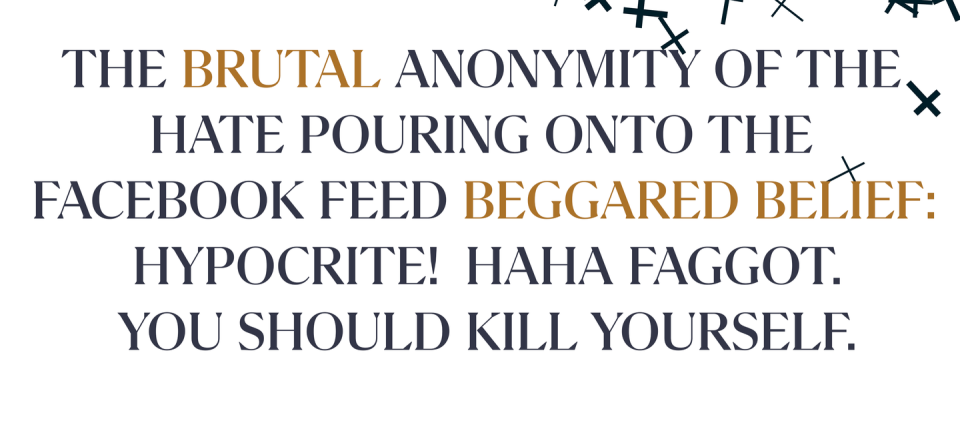
Afraid, and not knowing what else to do, Carter wrote to the story’s author, whose email address was posted on the 1819 News website. He received no response. The next day, Thursday, November 2, he wrote to him again:
Mr. Monger,
... I am Bubba Copeland’s son. What you have done is not by any means journalism. You have hurt the man who has been here for me my entire life. My father is my hero, always has been, and always will be. I have seen some awful things in this world and experienced a great deal of hatred myself as a gay man. You have fueled a fire of hatred and bigotry unlike any other I have ever seen in my life. I have over the last 24 hours watched my father completely break down. I truly wish I could express to you the emotions and the feelings I feel towards you and your colleagues, but I am unable at this time. My only wish now is that you are able to carry on with your life and have the peace which you have so heartlessly taken from countless lives by writing this article.... If you find time in your day to step aside from your [duties] I would greatly appreciate a call. More than anything else I would like to tell you the kind of person my father really is. You should truly be ashamed of yourself.
By that day, Bubba’s family, his church family, and several of his closest friends in Smiths Station had become concerned that he might harm himself. The 1819 News story was all anybody was talking about. And another story—more lurid, more humiliating, harder to explain—was on the way and would reveal the last of Bubba’s secrets to the entire world. He was in disbelief at the coverage, and the brutal anonymity of the hate pouring onto the First Baptist website and Facebook feed beggared belief.
Hypocrite!
HAHA faggot.
You should kill yourself.
Jason Price and Dan Elkins were the administrators for the church accounts. Along with another volunteer from the church, they would stay up all night taking down the comments so that Bubba wouldn’t see them. But Bubba couldn’t sleep and was fixated on the velocity and reach of the Internet and its lacerating judgments. As the calendar turned from Thursday to Friday, the community of people who knew him best and loved him most—the people you have just met, and many more besides—desperately tried to form a bulwark between him and the ugliness of the world.
Bubba, hold your head high. You are so loved and have so much support.
Bubba, you are going to get through this—we are going to get through this, together.
Bubba, just hold on, brother—get out of town for a few days, this will blow over.
Bubba responded: These are dark days.
Sensing his growing despair, his friends and family began sending more urgent messages:
Bubba, where are the guns?
Bubba, we can’t do this without you. How are we going to live our lives without you?
When the world comes at you, though, it comes at you.
The story had gone global, and Bubba couldn’t look away from his phone. Have you seen the New York Daily News? he would ask friends, obsessing over the latest headline.
This article appeared in the April/May 2024 issue of Esquire
subscribe
Elizabeth White, a WRBL News 3 crime reporter based in Auburn, Alabama, who reported on Bubba in his capacity as mayor of Smiths Station, says that “Bubba was down, and they just kept kicking and kicking and kicking. It wasn’t enough for them to just expose him. They wanted to hurt him. It’s devastating to know that for all the good he did, he spent his last days and moments in unbearable anguish.”
On the afternoon of Friday, November 3, feeling all but destroyed, Bubba Copeland finished the job and killed himself.
The Lee County coroner, Daniel Sexton, would write in his report that the cause of death was a.38 slug to the right side of Bubba’s head, just above the ear. But no clinical description of what a handgun can do to flesh and bone will ever capture the true cause of Bubba Copeland’s death.
The next morning, Bubba’s son again wrote to Craig Monger:
I hope if you ever have children, they never have to face what I am now going through. I hope that they never have to find out that their father caused another man’s death by his own hand. You and your colleagues took my father from me.... I hope the Lord’s judgment for you is swift and deliberate.
Carter Copeland is still waiting for a reply.
When a stranger comes to a small town asking painful questions of a grieving community, the third degree is not only understandable, it’s to be expected.
“You like coffee?” David White asks me. “Well, if you’re in Phenix City anyway, then I guess you should come by so we can look each other in the eye and size each other up.”
The doctor and his wife, Lori, live across the street from First Baptist Church. He is quick to point out that on Easter Sunday in 1865, Union general James H. Wilson began one of the last battles of the Civil War from his yard, staging his attack on Confederate fortifications across the Chattahoochee River in Columbus, Georgia, before going on to capture Jefferson Davis, the president of the Confederacy. White is bemused at his proximity to this history. In fact, he seems to wear a bemused expression as his face’s default setting. The staging area used by Wilson’s Raiders is now used to stage White’s beehives; his family’s annual “canning kitchen,” in which they put up thousands of jars of fruit preserves and jellies and pickles to give away to friends and strangers far and wide at Christmas; his own small vineyard, where he cultivates grapes for a wine that’s “best served in Dixie cups”; and the pits for the church barbecue on the last Saturday in April, where they’ll smoke two thousand pounds of pork.
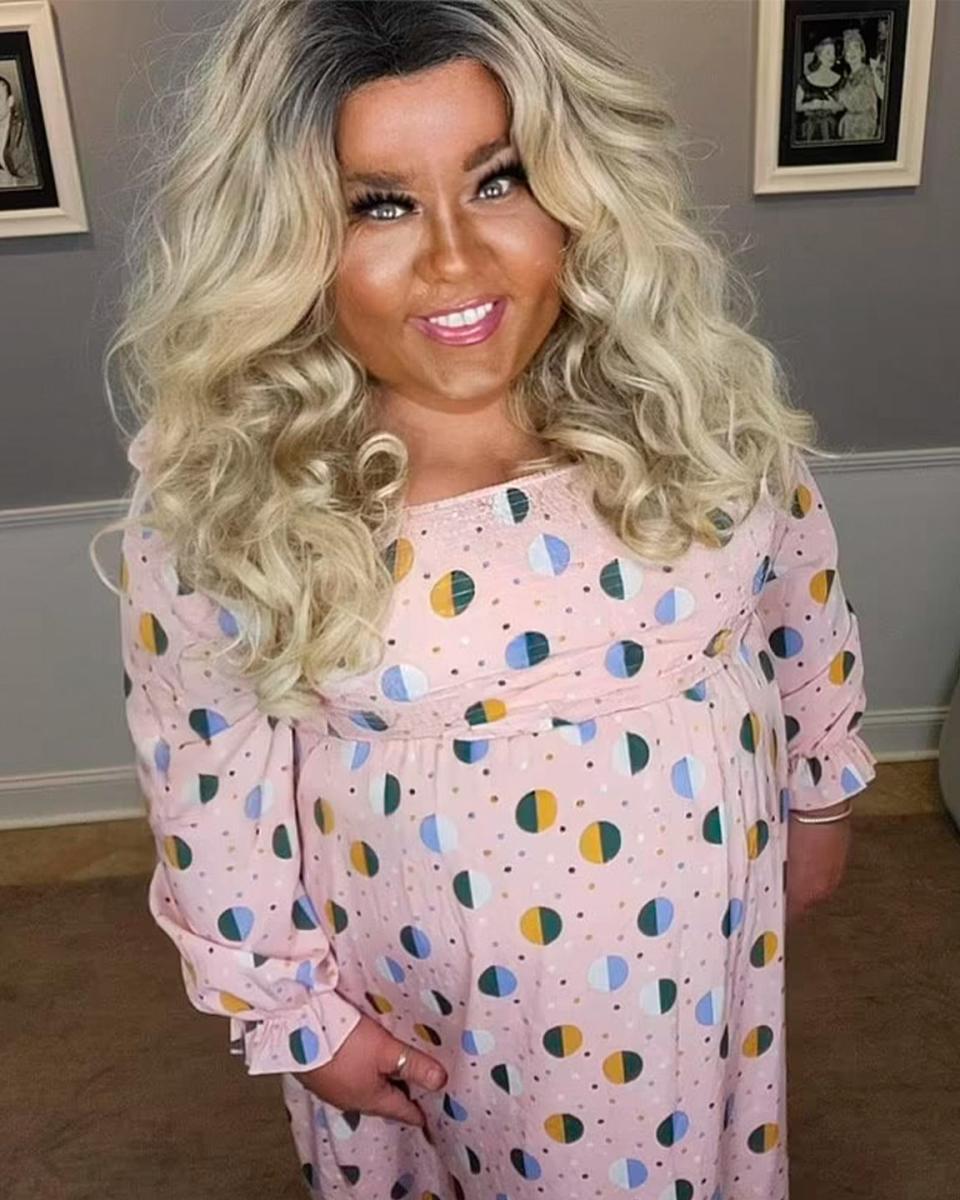
White is from Phenix City, fifth generation, and grew up in this house, which was built in 1906. During the Spanish flu epidemic of 1918, as there were no hospitals, the house was made into a flu infirmary, with the sick and dying in the front and concerned family members coming and going from the back, the two halves separated by a heavy curtain that no one was allowed to cross except for the nurse. The doctor would come once a day to leave morphine and aspirin, pronounce the dead, and figure out where to put the new arrivals. “There’s a Black community a quarter mile that way,” White says. “We all grew up together. That’s the way it was. And in those days, nobody had anything, so there was no economic distinction between neighbors. It wasn’t perfect, it wasn’t good, but it was a lot of people striving together to get by. It wasn’t all Ku Klux Klan.”
Per the census, Phenix City has a population of thirty-eight thousand, spread out along the Chattahoochee River, straddling Lee and Russell counties. But it has the feeling of a smaller town, essentially a modest suburb of Columbus, Georgia, directly across the river. Roughly half Black and half white, the diverse population is reflected in First Baptist’s congregation.
White’s father was born in this house in 1917 and was a newborn when both of his parents became gravely ill with the flu. The nurse was caring for White’s grandparents, who were laid out in the front of the house, and the baby was quarantined on the back porch. The need was so great, and the nurse was doing the best she could, but at one stretch she forgot about the newborn and went forty hours straight without crossing the curtain. When she realized what she’d done, she just knew that the baby was dead. She rushed through the curtain to the rear of the house only to find a six-year-old Black boy named Roy Pierson—who had sick family in the front of the house, too, and had himself been lost in the shuffle—caring for the baby, who was quite alive. “Roy was not big enough to pick him up. So he would sleep under the cradle and rock him, and he did his best to keep him clean, but he couldn’t figure out how to feed him. So he would get food and he would chew it up, and he would take it from his mouth and put it into my father’s mouth,” White says. “So when I came along in the South in the early sixties, my Uncle Roy was a Black man. He was my father’s brother, as much of a brother as my father would ever have, and they could not have been any closer had they been related by blood. That’s kind of the weave of the history here.”
He is wearing that bemused expression, but just the night before, White had been on the phone for half an hour, sternly interrogating me about why I had come to Phenix City. “We are hurting, our friend is gone, and we don’t need more salaciousness and scandal,” he said. “The press—so-called—did this to Bubba. Why would we talk to the press? People are concerned.”
He pours the coffee and says, “The people you are here to meet are still in shock at what happened and feel a profound sense of failure at not being able to save our friend. But if we are talking to you, it’s because we don’t want 1819 News to be the last word on Bubba Copeland.”
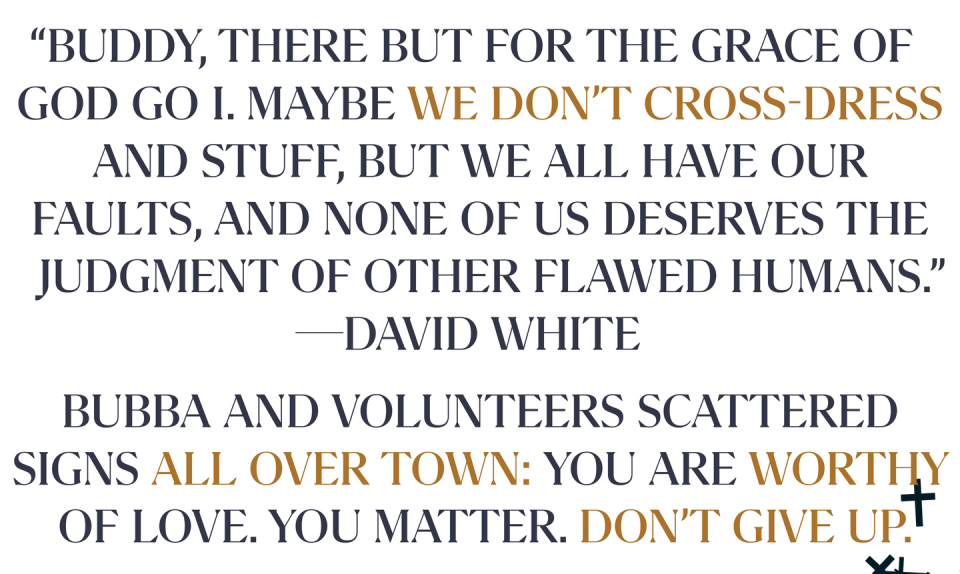
The people who exposed Bubba’s secrets said they presumed several things about him, chiefly that he was a hypocrite, preaching hate publicly for the life that he led privately. Bryan Dawson, the founder of 1819 News, would say publicly the week after Bubba’s suicide that Copeland was “pretending to be one thing—uber-conservative, Baptist, Trump, Christian, all of that”—while living a life that made a lie of those claims. Maybe Dawson was making broad assumptions about what it means to be a Baptist preacher in Alabama, but if he and his editorial team had known more about Bubba Copeland, they would have known that that assertion was far from accurate. Dawson would also admit that not only had he never heard of Bubba Copeland before receiving “a tip” about his online life, he had also never heard of Smiths Station.
The story of the Internet is of tribes hurling rocks over the horizon at targets they cannot see, doing damage that they do not care to measure. In this case, those assumptions and that ignorance would make Bubba less a human being than an ideological target in a raging culture war, and the damage radiating through these towns is now plain for all with eyes to see. And it’s not just these towns. Coinciding with the breakdown of our social order and abetted by technology of astonishing power, we find ourselves in a conflict over rapidly changing conceptions of gender and sexual difference. In the backlash to this upheaval, the casualties are mounting.
To learn about Bubba, who he actually was and what he cared about, it’s important to meet his church family, and the best place to do that is here, at David White’s dinner table. Here is where so many people have broken bread and laughed and carried on. Here is also where the trustees and deacons held an emergency meeting the Saturday morning after Bubba died to figure out if and how the church would continue. Lori White made biscuits and coffee, and a somber group sat around this table to plan the next day’s service, which is about all they had in them to do. One service at a time. Get through Sunday, then give some thought to the funeral.
It was decided White would lead the service the next day. He is an easy public speaker with a deep familiarity with scripture, and it was not unusual for him to offer a sermon. Bubba was eager to share his pulpit with speakers he saw as more talented than himself, and White had already been scheduled to do the talk that Sunday. But his sermon would need to be very different now. From there, he and Dan Elkins would share pastoral duties, and other area clergy—even including a Methodist pastor named Laura Eason—would be invited in to help keep the church going.
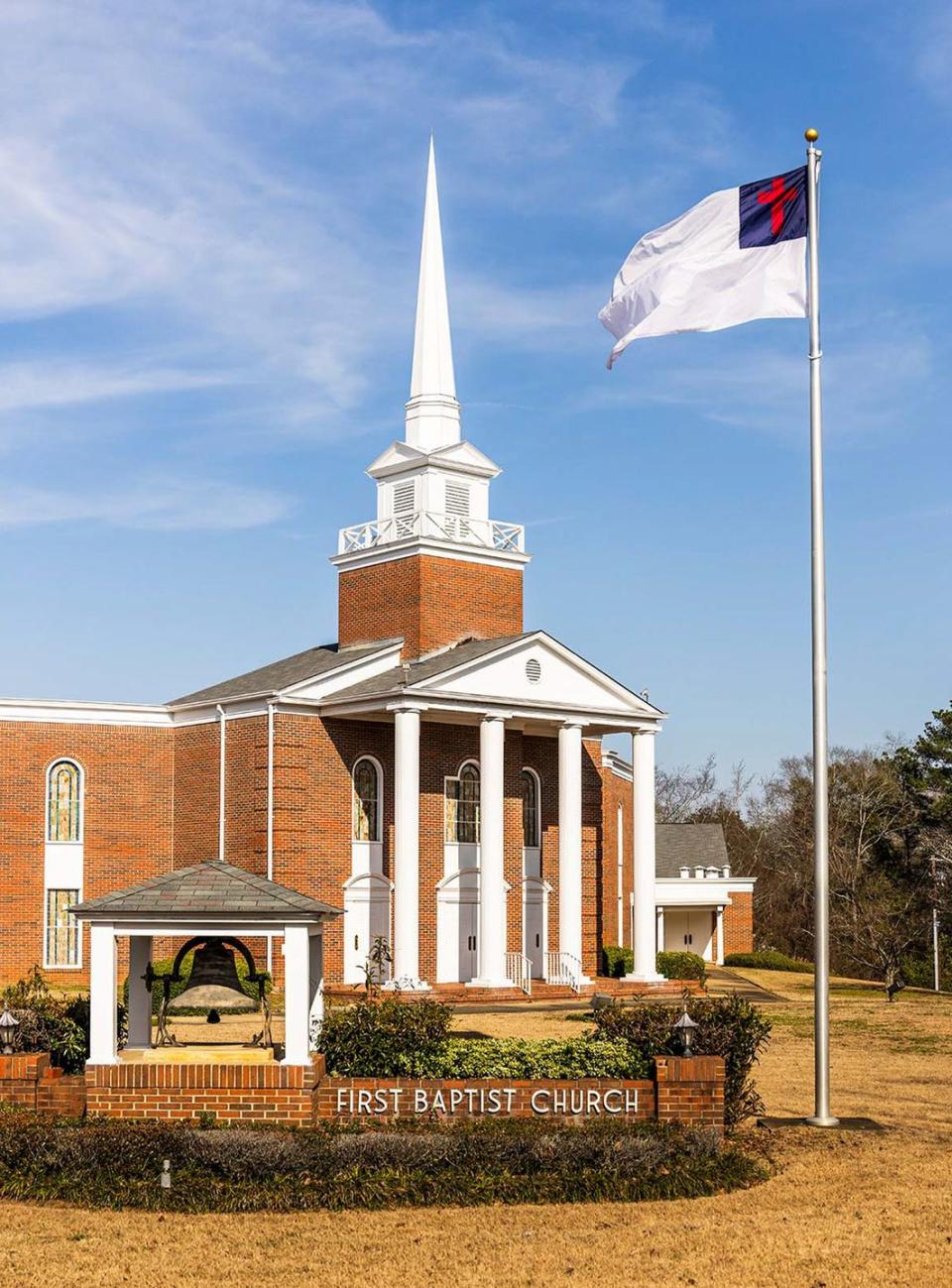
To keep going is the point of a church. Just as White and his family are fed at this table, so too are they fed at the church across the way. The need for spiritual sustenance doesn’t explain why we believe what we believe, but the two are intimately related, as with common purpose comes community. Coming together in awe and doubt in the face of eternity might be the last human feeling that AI can’t take from us. If a religion splits over a breach in heavenly doctrine or earthly politics or a combination of the two—as the Baptist church did in 1845, cleaved down the middle due to the belief held by what would become Southern Baptists that slavery was an “institution of heaven”—then the community splits, too, profoundly and perhaps irrevocably. The Southern Baptists are no longer confined to the South and now have churches in forty-one states, which makes them the largest Protestant denomination in the United States. In 1995, church leaders apologized for the faith’s racist origins and at the same time repented for the church’s opposition to the civil-rights movement and interracial marriage.
There have been other fault lines more recently, involving the enduring Old Testament penchant of more-conservative Christians to take it upon themselves to cast people into hell, as well as contemporary social issues—whether women can preside over services (an emphatic no in Southern Baptist churches) and whether God loves gay people (the Southern Baptist position might best be described as “hate the sin, love the sinner”).
What they all seem to agree on is that the Bible is a well-worn daily instruction manual and not some ancient relic. It is important to White that I understand the First Baptist ethos and the mark that Bubba left on the church in Phenix City.
“Our philosophy is this: We open those doors,” he says. “You can read your whole Bible, and nowhere in it does the Bible give you permission to judge your fellow man. But time after time after time, it tells you to love your fellow man. No matter what. That was Bubba’s attitude. It’s the attitude our church shares.”
It seems an uncontroversial point and a handy distillation of the foremost of the Christian commandments, familiar to anyone with a passing knowledge of the New Testament. All of the gospels enunciate a version of this basic tenet of Christianity, and the Gospel of Mark makes clear that there is “no commandment greater” than to love God and to “love your neighbor as yourself.”
“It’s not that complicated,” says White, “although because we are human, we keep pretending not to understand how this is supposed to work. We keep pretending that God intended for us to rough each other up using his Word. Buddy, there but for the grace of God go I. Maybe we don’t cross-dress and that kind of stuff, but we all have our faults, and none of us deserve the harsh judgment of other flawed humans. First and foremost, Bubba Copeland was my friend. I don’t fully understand what was going on with him, in his life and in his home, but I also don’t know that I’m supposed to. I don’t think it’s my business.”
The evening of November 1, after the 1819 News story had broken, Bubba led his last Bible study at First Baptist. He chose a fateful passage to teach: Psalm 23:1–6, which had him walking through the valley of the shadow of death. After the session, he walked into a very tense meeting of the church’s board of trustees that began in anger and ended two hours later in tears and hugs. The trustees, led by White, had, like everyone else, been blindsided by the story and just wanted to know one thing: Bubba, is it true?
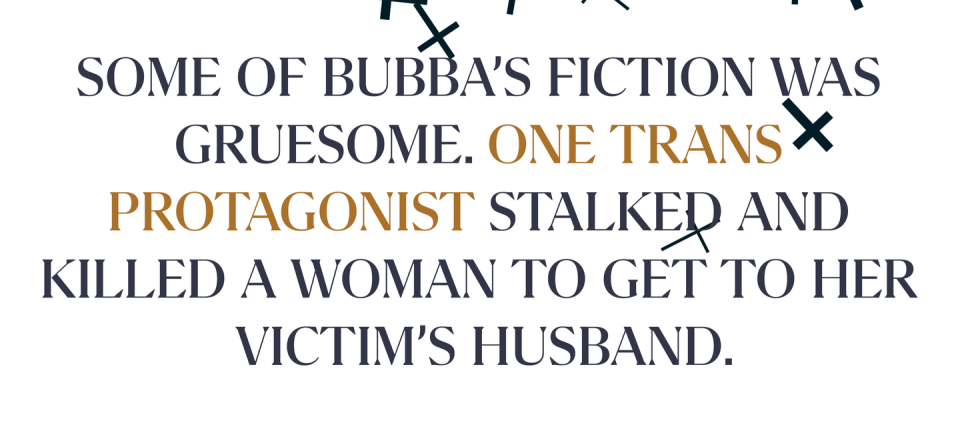
He maketh me to lie down in green pastures...
Yes, the pictures were real, he told them. They were private and never meant to be public. It was dumb to post them on the Internet. He was abjectly sorry for the embarrassment he would cause, adding that he would never purposely do anything to hurt the church or his friends.
He restoreth my soul...
“We did not suspend him. We did not reprimand him. We did not fire him,” White says. “We talked to him frankly. We expressed our shock and disappointment, and then we replaced that with our concern and our love and our support for our brother, who was suffering. The church would be fine. Now it was Bubba we were worried about.”
I will fear no evil, for thou art with me...
The next morning, one of the trustees from First Baptist who had been in the meeting the night before received a call from a man from the Russell County Baptist Association. The caller wanted to know what First Baptist planned to do to punish its pastor and why it hadn’t done so already.
Thou preparest a table before me in the presence of mine enemies...
The First Baptist trustee told the caller from the Baptist Association that as First Baptist had not been aligned with the Southern Baptist Convention for decades, the situation with Bubba Copeland was none of the association’s business.
Thou anointest my head with oil; my cup runneth over...
The trustee added that just as the New Testament instructs in the books of Matthew, Luke, and Galatians, when a brother goes astray, as Paul wrote in his letter to the early Christians of Galatia, “you who are spiritual should restore him in a spirit of gentleness.”
Surely goodness and mercy shall follow me all the days of my life, and I will dwell in the house of the Lord forever.
Matthew emphasizes that this counseling should be done privately; Luke, the importance of forgiveness after repentance. And that, the trustee told the caller, was how First Baptist planned to address the situation with its brother Bubba Copeland. Thank you for calling.
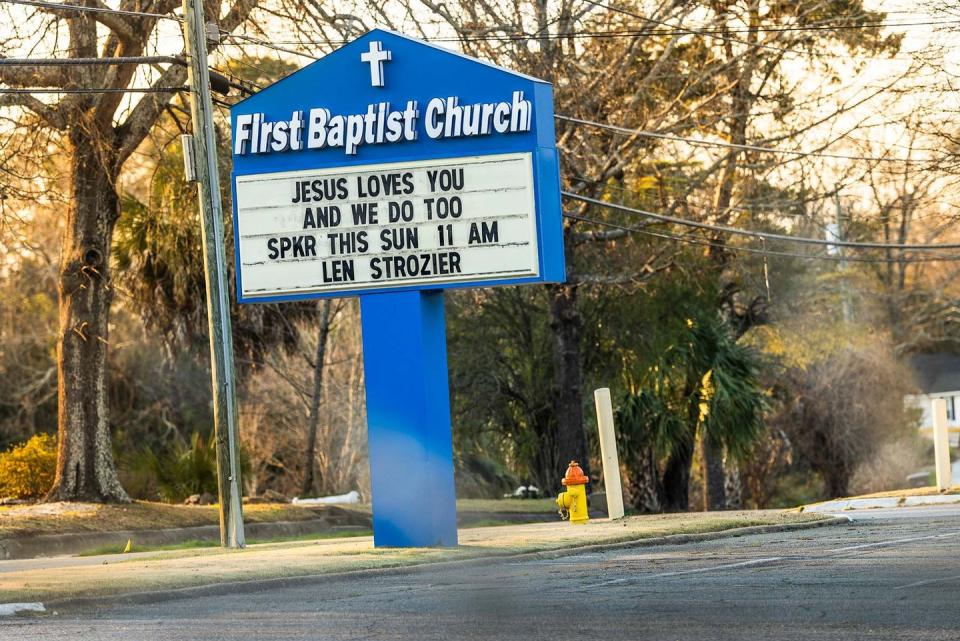
“We haven’t been Southern Baptist for twenty years,” White says. “And you’re probably not going to find another Baptist church in a small town anywhere that has gay couples that come to church every Sunday. Of course, you have to be sensitive, because we have members that are old-school, in their eighties and nineties, and they might not be ready for all of that, but they’re accepting. After Gene Langner died, we started looking for a pastor. I was on the search committee that brought the next pastor here, and we had people in church that were gay. It was generally known but not discussed. And the older members, some of them—the staunchest, most Republican, redneck guys, I mean—I grew up around them and I watched God change them, but they’re still very conservative. And more than one of them came up to me and said, You’re looking for a pastor, but, you know, so-and-so sits over there in the third row. They’re kind of different. Don’t you bring anybody here that’ll hurt them or turn them away.”
The Southern Baptist Convention still regards sexual difference as an abomination against God, and even homosexual desire not acted on is “always sinful, impure, degrading, shameful, unnatural, indecent and perverted,” according to the denomination’s “Resolution on Homosexual Marriage.” As a remedy for impure thoughts, the SBC endorses sexual reorientation.
When Dan Elkins had his country church in southern Alabama and was struggling to reconcile his ministry with his sexuality, he came out to his then wife. That was 1996, and it would be seven years before they would divorce. “We did counseling, and I was told, You can beat this with prayer and fasting, and I prayed, and I fasted, for years—ever the good little Baptist boy—but I was earnestly trying to change something that simply can’t be changed,” Elkins says. “I had come out to a confidant at church, and that person betrayed my trust and it got out in the community, but I didn’t know it. We showed up for church one Wednesday night and the parking lot was full, and I’m like, Something’s going on. This was January 2002. Oh my word. If Facebook had been around then, I’m not sure I’d be here. I’m not sure that I would have seen the way out. Like Bubba couldn’t see the way out.”
In this pocket of East Alabama, though, the church doors are open, and the Bibles say that God loves everybody. “That’s how this church has evolved,” says White. “We have members who are gay and married and accepted, and that’s relatively new. And we have older members who are accepting even if they don’t understand. It’s been a long trip for them. You cannot fail to recognize how far they’ve come.
“And that’s Bubba’s legacy,” White adds. “I can tell you that his legacy is not defined by that week. His legacy is defined by the friends he leaves, by the people that he led to the Lord, by the life and values he lived. That’s his legacy. Not 1819 News. 1819 News is to journalism what a quack is to the practice of medicine.”
Bryan Dawson believes in redemption narratives. Especially his own. The founder of 1819 News (so named because 1819 is the year Alabama became a state) has a compelling personal story that he has honed into a performance piece on various podcasts and pulpits across Alabama for the past several years, although he is not from the state or even the South.
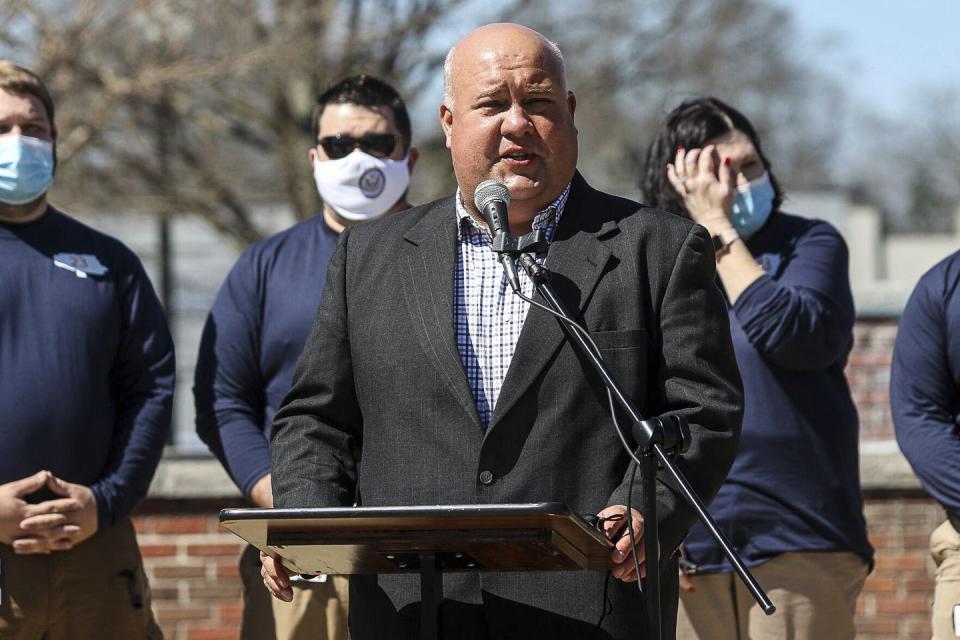
As a young man, Dawson lived in Colorado Springs, and it’s there that his life of crime gave him the material for his story. He trafficked in weed, cocaine, and meth; was the kingpin of a “motorcycle, automobile theft ring”; and in spring 2007 beat a “snitch” over the head with a chain with a padlock at the end of it, for which he would be charged with attempted murder, among other felonies. (He would eventually plead to reduced charges and receive a sentence of sixteen years in prison.) These experiences have been memorialized numerous times in the press, in stories such as “From Breaking Bad to Redemption: The Story of Bryan Dawson” in Newsweek and in an interview on his own website titled “From Tragedy to Triumph, the CEO of 1819 News Shares His Story.”
In his story, he tells of a sad and lonely young man with no self-esteem raised in a broken home, who is always put in the “friend zone” by young women and who only ever feels comfortable as himself when he is high or drunk. And then he becomes a violent criminal, faces hundreds of years in prison, is extended grace and kindness over and over again by strangers and the state, finds God, and is ultimately salvaged by a community that forgives him seventy times seven (Matthew 18:21–22). In the details and framing of his story, Dawson is pleading for understanding, and his adoring interviewers give it to him; one even adds at the end, “I think if you had been born way back, you would be in the Bible.”
Yes, you might say that Dawson’s Colorado Springs redemption epic is like Saul on the road to Damascus, if Saul had attempted to murder a man with a padlock on a chain, causing “permanent disfigurement,” according to the attending physician in a police report, who added that “the victim was lucky to be alive.”
Saul of course repents, calls himself the “foremost of sinners,” and becomes Paul, the greatest writer of the New Testament. In his redemption narrative, Dawson also becomes a different person, but when he tells his story this new person doesn’t mention the man he tried to kill, doesn’t indicate how he feels about him or whether he ever thinks about how he might be getting on with his permanent disfigurement. Instead, in his redemption story, Dawson occasionally shines a little light on his supporting cast—his wife, his mother—but mostly he finds satisfaction in the power of his own narrative. His interviewers feel the same way, and they interrupt him to say things like It’s just like in the movies!
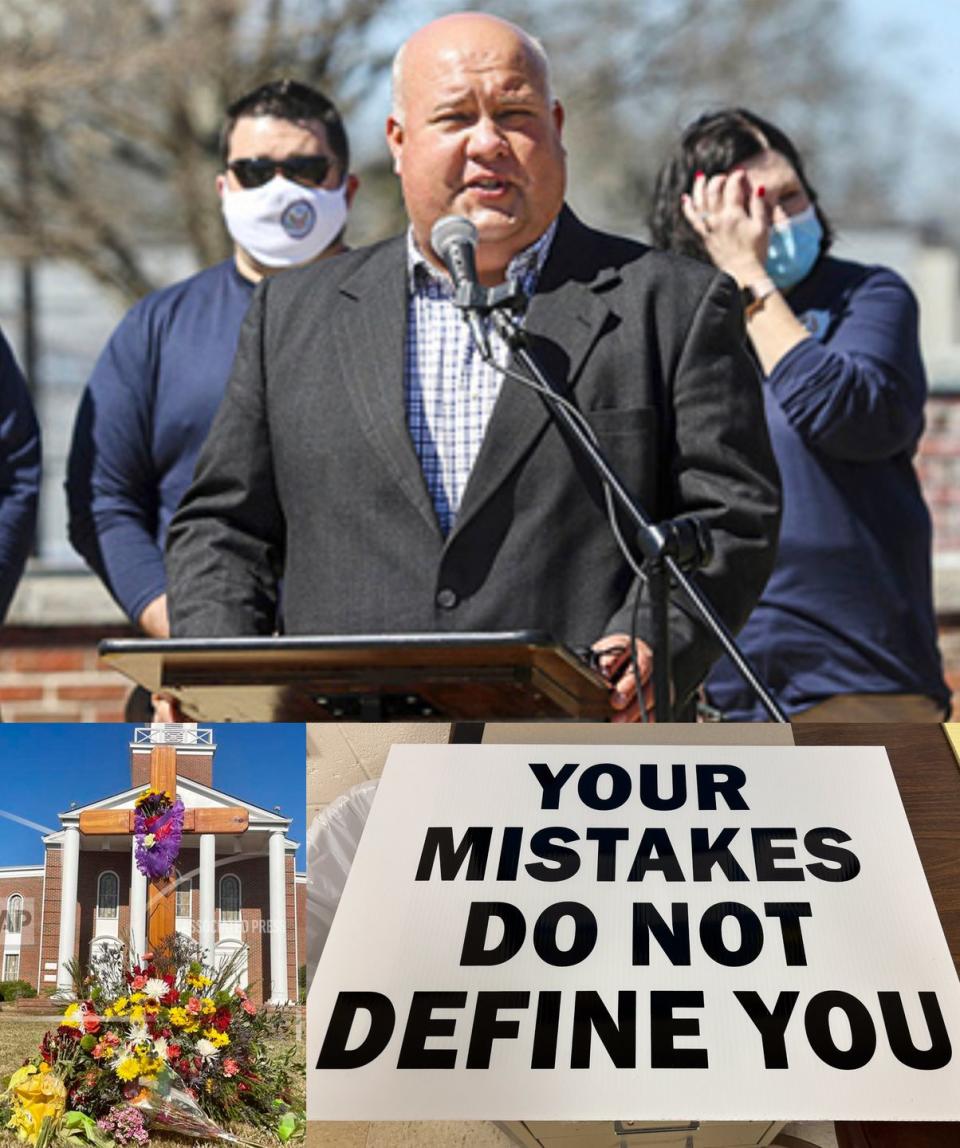
Which brings us to his fresh start in Alabama, where he grew an apostolic beard, started to allow the slightest bit of a twang in now and then, joined a Baptist church in Wetumpka where he sometimes preached from the Old Testament and where just ten days before his life intersected with Bubba Copeland’s he delivered a sermon that revealed him to be an aspiring theocrat. Preaching from Deuteronomy and Samuel, he refers to “God’s government”; is entranced by the “rod of correction,” the “power of the sword,” and offenses against God that are “punishable by death”; warns of the consequences that will come when a church “neglects to use the sword properly”; and says things like “We’ve done a great job of rooting out the rubbish and the refuse of the Philistines in our church. We’ve done a phenomenal job” and “Right now in the state the fear of God is not before their eyes, so they just do whatever they want.”
Appearing on a podcast this past January about the “Dangers of Progressive Christianity,” Dawson said that “progressive Christianity comes from feminism creeping into the church” and that the one true faith had fallen victim to “soccer moms” and their tendency to be more welcoming and less judgmental. In the same broadcast, he trained particular fire on a prominent evangelical minister who had sparked controversy by advocating that churches be more supportive of the LGBTQ+ community. For this, Dawson called the minister an “apostate” and a “full-blown heretic” and then went on to improvise that the man was gay and was cheating on his wife, and to finish the point he said, “I wish there were Old Testament lightning strikes that happen to people when they blaspheme the Lord the way that he does.”
The Lord did not bless Bryan Dawson with a talent for public speaking, but what he lacks in fire he makes up for in brimstone. His Christianity seems somewhat unfamiliar with its namesake. In that, he is a familiar figure, older than time, and not only among Christians—a religious enforcer who knows just enough of a holy book to be dangerous. You might say that he put down his padlock, picked up his Bible, and didn’t skip a beat.
Dawson then merged his brutal version of the Christian faith with the often brutal politics of Alabama on the always brutal platform of the Internet and in late 2021 founded 1819 News to counter the most prominent news site in Alabama, AL.com, which is, he says, “communist propaganda.”
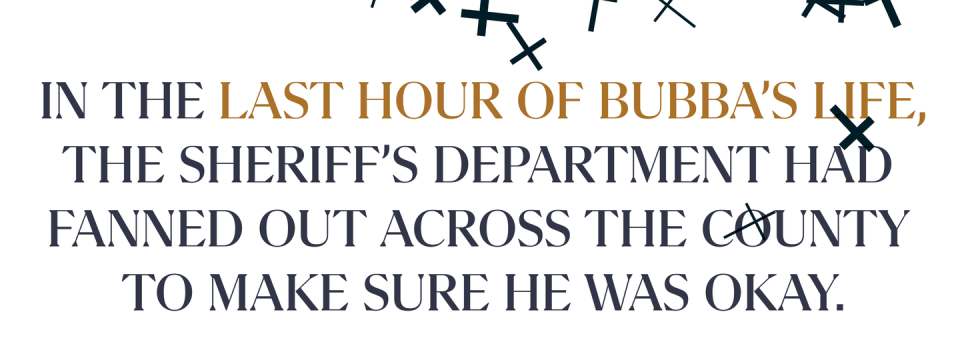
These details of Dawson’s story are important, because in the moral calculus of 1819 News, Bryan Dawson is allowed a redemption narrative sanitized of victims, but Bubba Copeland is not. Perhaps that is because Dawson’s violent felonies were manly crimes, just like in the movies, whereas Bubba Copeland’s transgressions were of thought and behavior that Dawson could not square with his version of the faith and would not tolerate, and rather than extend Copeland the grace that he himself had been the beneficiary of so many times, he ignored Bubba’s plea for mercy and leveled him instead. He and his editor in chief, Jeff Poor—an alum of the Daily Caller and a regular contributor to Breitbart—would make the case that it was Bubba Copeland, who did not preach violence from his pulpit, who was the dangerous one. After his death, they would assert publicly that he was a troubled man, that he had victims, that it was their duty to expose him, and that, as Poor would say, “the people at First Baptist Church, Phenix City, had a right to know what their worship leader was doing.”
On the day that Bubba Copeland took his own life, 1819 News published its second feature on his fantasy life online. This story was even more lurid than the first, detailing pieces of erotic fiction that Bubba had posted as his alter ego. Some of the fiction was gruesome—one story in particular dealt with a trans protagonist who stalked and killed a woman so that she could have a relationship with her victim’s husband. The story was titled “Dangerous Obsession”: “In my cubicle I scanned her page. She posted a new picture! Excited I screenshot it to add to my ever-growing collection. To say I was a stalker would be a bit of an understatement. Every post she made I studied it, analyzing and taking notes of her daily routine. What she ate, what she drank, from her favorite coffee to her favorite alcoholic drink. Her life had become my obsession.”
In the two days since 1819 News had posted its first story, it had been alerted that Bubba had used pictures of at least two real people from the Phenix City area in at least one of his posts—a meme about transitioning. The two were a brother and sister, and people from the community have confirmed for me that the brother was a minor when the picture that Bubba used was taken. In his second feature, correspondent Craig Monger wrote that the father of the children pictured had called 1819 News, informed the site that the pictures were of his children, and asked them to remove the images. (The photo of the boy was taken from the father’s social-media account.) In his posts, Bubba seemed to use photos from the Internet both purposefully and indiscriminately, once including an image of a teenage girl who was not from the area.
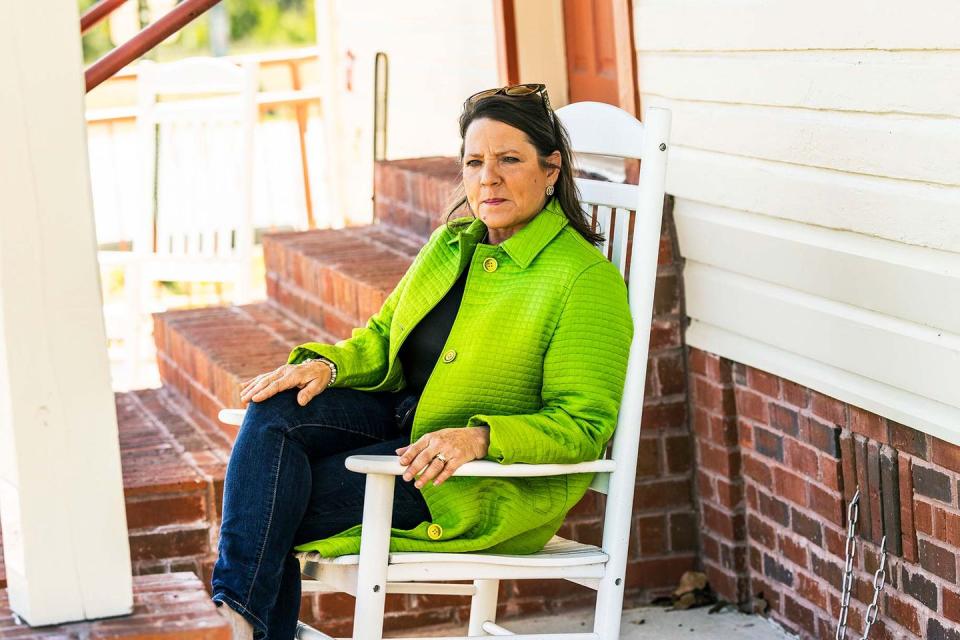
A local woman had contacted the site to say that Bubba had used pictures of her in some of his posts. Monger also discovered that Bubba had used the name of another local woman in “Dangerous Obsession.” I reached out to the father of the brother and sister but did not hear back, and also to both of the women. One did not reply, the other wrote back, “No need to bring all of that back up as those... families heal.”
When Dawson and Poor had published their exposé on Bubba two days earlier, the 1819 News editorial team had apparently not been aware that he had used the names and images of people he knew in posting to his online community. But in the days after his death, his poor judgment would become their justification for having published the stories in the first place. 1819 News’s initial imperative—to expose a cross-dressing pastor that its editorial team had assumed to be a hypocrite—would no longer be enough.
The week after Bubba’s suicide, Dawson and Poor released a thirty-four-minute video podcast on which they outlined all that had gone into their decision to publish their exposé. The timeline, they say, is that they received a tip about Bubba’s online life on Monday, October 30. They called him for comment. They published on Wednesday morning after deliberating for three hours the night before on whether to go through with it.
In the video, the two strike a sober pose. “It’s a tragic situation where no one wins,” says Dawson. They grant themselves absolution for doing the right thing and say that they feel besieged by criticism on social media that 1819 News had acted irresponsibly. Dawson does not allow himself to understand the reaction in anything other than ideological terms. “This story,” he says, “has shaken things up in the leftist community!”
Poor wears the look of a man surprised to find himself in the middle of a matter of such consequence and bristles at the suggestion that decisions he was party to might have contributed to the death of a man. Don’t assume that Bubba Copeland killed himself because of those stories, he says. “We may never know, but don’t assume that.”
As they hash out their reasons, Dawson and Poor repeatedly refer to “Dangerous Obsession,” acknowledging that the story is fantasy while nonetheless treating it as if it were evidence of real conduct. Poor becomes exercised and shouts, “What if people don’t ever find out about this? What if it just is allowed to continue on into the future?” And then, with no apparent basis in fact for saying so, he adds this: “We don’t know what else is out there—don’t assume that there’s nothing else out there. This behavior does raise a lot of unanswered questions.... I think maybe a little caution here is warranted.”
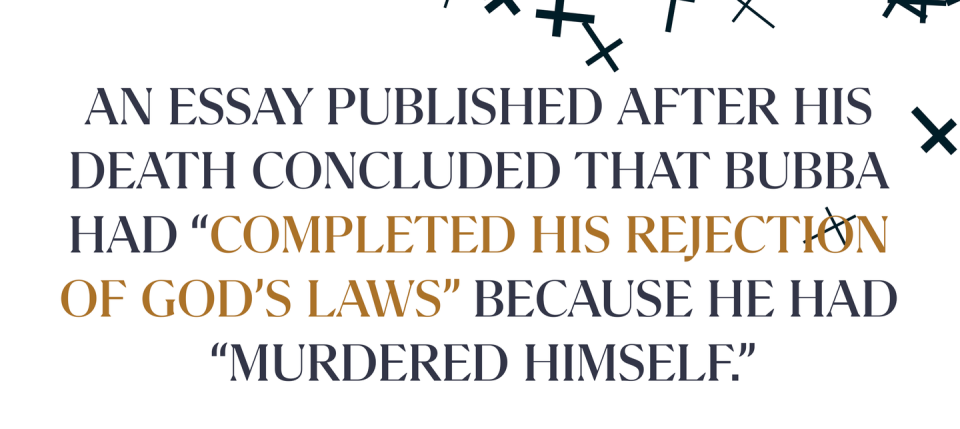
Six days after Bubba Copeland killed himself and his family and community had been devastated, the editor in chief of 1819 News began to urge caution while continuing to assassinate his character.
Near the end of their podcast, Poor says that although he was “not celebrating the death of Bubba Copeland,” he was “at peace” with the decision to publish.
It’s easy to see that Bubba was wrong and crossed an ethical line in using the names and images of people he knew in his fiction and other posts. One can only assume that it must have been an awful experience for those two women and the father of that brother and sister to be unexpectedly swept up in this story. But in this Alabama skirmish in a hellish culture war—over gender and speech and objective reality itself—with its dehumanized politics and competing conceptions of heaven, suffused with rage and loss and bereft of much clarity, two things are clear: First, 1819 News wanted the whole world to see Bubba’s posts, without fully understanding what they contained. Before posting its stories, the editorial team there also didn’t seem to know much beyond the few facts they had discovered, things they saw as sensational and repugnant. And second, Bubba Copeland was desperate for his hidden life to remain hidden and never intended for anyone other than perhaps his wife and the other pseudonymous members of his online community to see his posts. He was shattered at the sudden collision of his private and public identities and killed himself.
The last story 1819 News published about Bubba Copeland came on November 11, eight days after his death. It was a short essay in support of the editorial decision to run the stories, and its conclusion was that Bubba had completed “his rejection of God’s laws” because he had “murdered himself.”
I wrote to 1819 News four times, asking to discuss the stories it published about Bubba Copeland. I did not receive a reply.
He gave himself the nickname, as he didn’t much care for “Fred Copeland Jr.” and thought that “Bubba” sounded friendly. He was a standout linebacker for the Smiths Station high school football team, but his real passion in school had been acting in drama productions, because, as he would tell his son, “you can become someone else for a moment.”
When he and his first wife, Merrigail, were dating, Bubba sat her down one night and said he had something to tell her. “Have you heard of transgender?” he asked her.
“Bubba, I have no idea what you’re talking about,” she answered. He explained it as best he could, and then Merrigail asked, “Why are we talking about this?”
“Well, I dabble in that,” he said. “There have been times that I have dressed up.”
The news threw Merrigail, but the attraction between them was so strong that she thought their relationship could withstand anything. The couple were married in 1997, and she would soon come to believe that Bubba had a compulsion that he couldn’t control. When they’d been married for a year or so, they decided to buy a dog. When the day came to pick up the dog, Bubba was working, and so Merrigail and her father, Pastor Langner, walked out to the garage to get some rope to secure a large crate. When she opened up the tool chest on Bubba’s truck, she found that it was full of women’s clothes. Merrigail turned to her father. “Dad, I don’t want to embarrass him,” she said.
“I won’t,” her father said.
A few years later, when she was pregnant with their son Carter, she discovered some “transgender stuff” on his computer one afternoon. When Bubba got home from work, he found Merrigail crying. He apologized profusely, saying that the stress at work was too much for him and that dressing up was an escape. “I’ll try to do better,” he told Merrigail. She knew how bad her husband’s stress was. Bubba worked with his father, who, she felt, “talked to him like he was a dog.” Fred Sr. was a hard man, a combat veteran who had returned from Vietnam and made his fortune in the grocery business in Georgia and Alabama. Bubba would often come home saying that he wanted to do something different with his life.
Merrigail’s father told her, “Sweetheart, he can’t help it. This is who he is.” Langner would counsel his son-in-law with compassion, saying, “Bubba, Christ didn’t come into this world for us to be two people. You can only live one life. You need to decide which life you’re going to lead.”
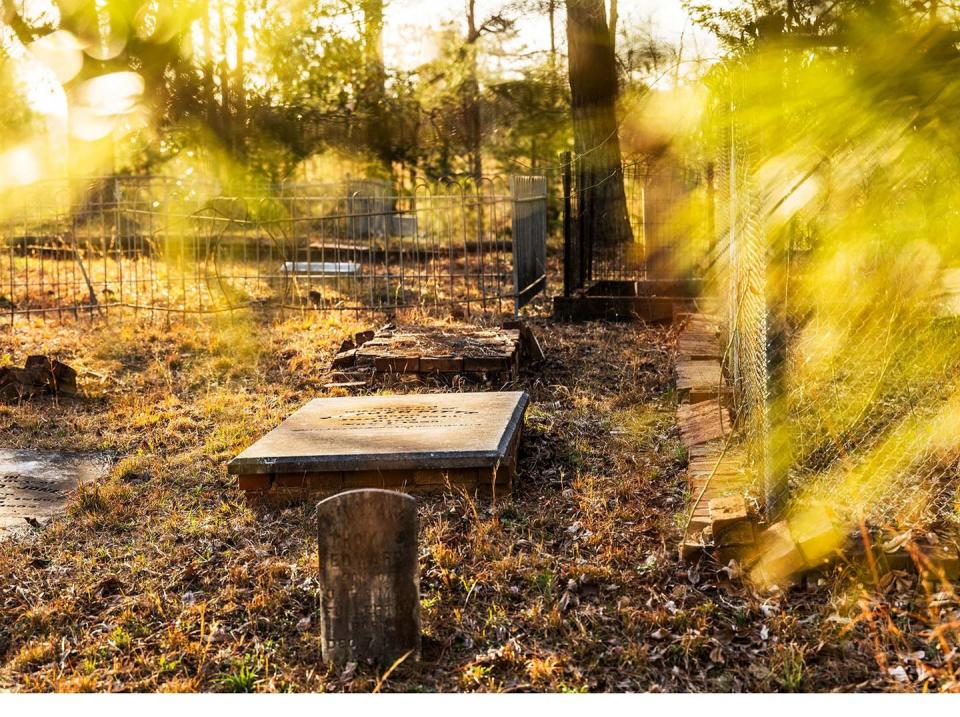
In East Alabama, though, Bubba couldn’t imagine a world where he could be himself in a way that people would accept. The marriage broke down, and when the couple divorced in 2009, Bubba was so despondent that he seriously contemplated suicide. One morning, when Carter was eight years old, he found his father sitting on the floor in the shower, sobbing. “I said, ‘Dad, are you okay? I love you,’ ” Carter remembers. “And he said, ‘I’m okay, buddy. I just need a second.’ ” There’s a nineteenth-century cemetery—Mechanicsville Cemetery, it’s called—near the grocery store Bubba owned, and he would sometimes go there to think when he was troubled. After dropping Carter off with the babysitter, Bubba went to the cemetery, intending to kill himself. He had the barrel of a handgun in his mouth when his phone rang. It was an old friend from town, who told Bubba, “Hey, buddy. The Lord put you on my heart, and I just wanted to tell you I love you.”
The call stopped Bubba. But his torment would continue.
After the divorce, Carter lived mostly with his father and attended the Glenwood School in Smiths Station, a private Christian academy. Bubba was a devoted father, and in the years before he met Angela, his life revolved around Carter. Two things happened in the years before Bubba remarried that would define the relationship between father and son. When he was twelve, Carter came across a digital camera in his father’s closet full of pictures of Bubba dressed in women’s clothes. “This is not something that I ever wanted you to find out,” Bubba told his son.
“I just need to know if you’re doing something really wrong, Dad,” Carter replied.
“Absolutely not,” Bubba answered. “This has been a hobby of mine for a while. It’s my escape.”
When Merrigail found out that her son had discovered his father’s secret, she said, “Your dad is an incredible man. Don’t let this change the way that you feel about him.” It didn’t. In fact, it gave Carter the feeling that he could talk to his father about anything.
Two years later, when Carter was a freshman in high school, he told his father that he was gay and that he was struggling with how to live honestly at school and in the world. He wanted to be free to be himself. God had made him this way. Why would he hide who he was? His father was afraid for Carter and angry that he couldn’t talk him out of coming out publicly. He knew what would happen to him, doing so at such a young age in such a small town, and the two fought bitterly. Bubba wanted him to wait until college to come out, wanted him to go far away, be happy, live his life. Carter decided instead to come out to a cherished teacher who betrayed him to a school administrator, who called Carter into his office and told him that he was going to hell. Once the news spread, Carter experienced what felt like torture. Students would spit on him in the bathroom, throw food at him in the lunchroom, and threaten to physically attack him. The teachers were of no help, as they now hated him, too. There was no safe harbor for the gay kid at the Christian school.
There is nothing like being the singular locus of a compounding hatred, in a closed system that justifies the hatred and calls it good. After school one day, Carter went home, his head full of monsters, and he swallowed a bottle of pills. And then he walked into his favorite room, the family library with its cathedral ceilings, and lay on the floor and looked up and watched the ceiling fan turn. His father found him there, saw the empty pill bottle, and dragged him to the bathroom, where he put his fingers down Carter’s throat.
It would be the first of several suicide attempts for Carter. Time after time, his father would save him. And the last time, Bubba just held Carter and told him, “God loves you, Carter. And I love you, too. Don’t listen to those people at school. There’s nothing wrong with you. The only thing wrong with you is the judgment of the world.”
“And then he said this: ‘Carter, if I can survive this, you can survive this, too.’ And we made a pact with each other that day that we would live. We would make ourselves happy, we would make others happy, we would live fulfilled lives. And as long as one of us had to do it, the other had to do it, too. ‘No suicides. Promise?’ ”
Carter says now that he realizes that by coming out when he did, he was trying to show his father that it’s okay, that you can be who you are. It’s all right.
“I had reached a point in my life where I had begun to accept myself,” he says. “I had finally gotten to that point, and now my own father had to go through it. And the people that hated me and wanted me to be morally punished were the same people that took my dad from me.”

It was the afternoon of Friday, November 3, 2023. The last hour of Bubba Copeland’s life. For days, those who knew him best and loved him most had encircled him, lifting him up, trying to hold tight to keep him from slipping away. Their efforts had seemed to be working. Earlier that day, Bubba had gotten a couple new tires for one of his cars, he’d stopped by the government center in Smiths Station to pick up his new city credit card, he’d checked in at the country market. He’d also sent a long and heartfelt letter to the congregation of First Baptist, thanking them for Pastor Appreciation Day, in which he seemed to see a future. “I look forward to continuing our journey of faith, growth, and service together,” he’d written. Now he’d gone missing. In Auburn, Carter Copeland received a call from his stepmother, Angela. “Your dad just called me. And he said that he loves me and that he’s always loved me and to go to my parents’ house. And then the call dropped off, and now every time I call him, it goes straight to voicemail. I don’t know what to do, Carter. You know him better than anybody. Where is he?”
By then, the Lee County sheriff’s department had fanned out all over the county to find Bubba and make sure he was okay. It wasn’t just law enforcement, either—Bubba’s friends and family had also begun searching for him, and as Carter ran to his car to make the drive from Auburn, Lisa Deason, who had worked as Bubba’s communications director in Smiths Station, had gone looking for him, too, and was pulling up at Bubba’s house. Deason had helped him draft letters of resignation as mayor and pastor just the day before. The letter resigning from his position as pastor read, in part, “Admittedly, there have been instances where my wife and I have taken private pictures within the confines of our home, which should have never been shared online. I realize this was a significant lapse in judgment and a personal failure, for which I bear complete and absolute responsibility.... I apologize for any distress or humiliation my actions may have caused. Love to all, Bubba.” The letter would never be sent.
Like many of his other friends, Deason had been urging Bubba to get out of town for a few days, let the Internet find somebody else to destroy, let things blow over. That morning, though, 1819 News had dropped its second feature on Bubba and, mesmerized by the coverage on his phone, he had started telling people that he didn’t know if he could go on. The night before, Dan Elkins and Jason Price had had a long talk with Bubba about his growing despair, and Elkins had asked him, “Bubba, where are your guns?” Bubba said that he had surrendered his handgun to a safety officer in Smiths Station. As several of his friends would say, though, he lives in the South and his name is Bubba—he’s got more than one gun.
The latest 1819 News piece seemed to break something in Bubba, unleashing a lethal shame, and by that afternoon his phone was as dangerous a weapon as his gun.
Not finding Bubba at home, Deason stood in the driveway of his house and called 911, saying that her friend was suicidal, and at that moment, his Tahoe pulled up in front of the house on Oakhurst Drive. He got out and left the motor running. “What are you doing here?” he asked her.
“I came to check on you.”
“Who’s with you?”
“I’m by myself.”
“Do not tell Angela where I am. I mean it. Don’t you tell a soul where I am.”
Bubba went into the house for no more than thirty seconds, and when he came out he was walking fast and moved to get back in his truck. “I love you,” he told Deason, “but I got to go.”
She said, “No, I’m not going to let you do this, Bubba! Please don’t do this. You have way more people that love you than you can even imagine. Don’t do this. Don’t do this to your family. Please. Don’t.” Deason was sobbing now and trying to hold on to Bubba, with her arms wrapped around him. No, I’m not letting you leave. Realizing she couldn’t restrain him, she let go, ran around him, jumped into the driver’s seat, turned off the ignition, and grabbed the steering wheel. I’m not going to let you leave.
“I’m going to do it in front of you if you don’t move,” he said. Bubba pulled her out of the truck, and in desperation, she was thinking, What the hell can I do? In that instant, 911 called back, and instead of the operator, it was Jeff Pitts with the sheriff’s department on the line.
“What’s going on?” Pitts asked.
“He’s trying to leave and he won’t listen to me! He’s adamant. He says he’s got to end it.”
“Let me talk to him.”
“Bubba, it’s Major Pitts, Jeff Pitts.”
“Jeff, man, I love you,” Bubba said. “But I’m done. I can’t do this no more.”
Bubba handed the phone to Deason, got in his truck, and peeled away.
As he drove, a cousin who had joined the search pulled up behind him. Bubba told him, If these deputies make me stop, you’re going to see something that I do not want you to see.
Carter was driving 100 miles per hour toward Mechanicsville Cemetery, because he knew his father might be there. He called his father’s number over and over. Nothing. And then his father called him.
“I love you, buddy,” Bubba said. “I’ve lived my whole life to make sure that you are successful and that you have what you need. And I just want you to know that I love you more than anything in this world.”
“I knew immediately what that meant,” Carter says. “And I just said, ‘Please, Dad, please tell me you’re not doing what I think you’re doing. Please, we can get through this.’ ”
“It’s too late, son. I love you. I’m so sorry.”
“I told him, ‘You have nothing to be sorry about. There’s nothing to be sorry for. I love you. You’re my hero. Always will be. This is going to be horrible. We’ll get through it.’ ”
“I’m sorry. This is what I have to do. This is the only way out.”
Carter remembers feeling desperate to hold on, desperate to find the words that would make his father stay, desperate. He screamed at the top of his lungs and felt a rush of emotion such that he thought his vocal cords might explode. I love you! I love you! I love you! I love you! “I screamed it as loud as I could for as long as he was on the line, because I knew he was listening. I knew. I could see he was still on the call. I kept screaming. That’s all I knew to say was, I love you! It’s okay. I love you. It’s okay!”
And then silence.
In the immediate aftermath of Bubba’s death, along a country road in the town of Beulah, Lee County sheriff Jay Jones took possession of his electronic devices, and his office searched them for evidence of criminal conduct. They found none. “In my view, Bubba Copeland would never intentionally do anything to harm anyone,” Jones told me. “I just don’t think that he was that type of person.”
David White would write a new sermon for the Sunday after Bubba’s death, staying up well past midnight the night before, sitting at his dinner table, writing in longhand. He would preach Psalm 23:1–6, just as Bubba had in his last service. And he wanted to make sure the world knew that the church had remained true to its pastor and always would. “Despite what may have been implied in the media,” he wrote, “members of this church have been steadfast in their love and concern for our pastor.”
We all have things that we don’t want other people to know about us. Things that might be hard to explain, even to ourselves. The First Baptist Church of Phenix City did not abandon Bubba Copeland, even after learning the secrets that he might not have been able to explain even to himself.
Bubba’s body would be turned away by the two Baptist cemeteries in Smiths Station, his hometown, the town that he loved. He is buried in a private family plot many miles away.
As I finished my reporting for this story, I took to asking the people in Bubba’s life what they might say to the people at 1819 News if they had the chance. Several told me that they are required to love them and will be praying for them. As Bubba Copeland always said, “God loves you, and so do we.”
You Might Also Like

